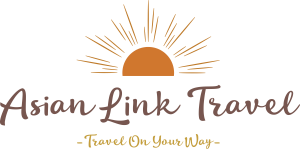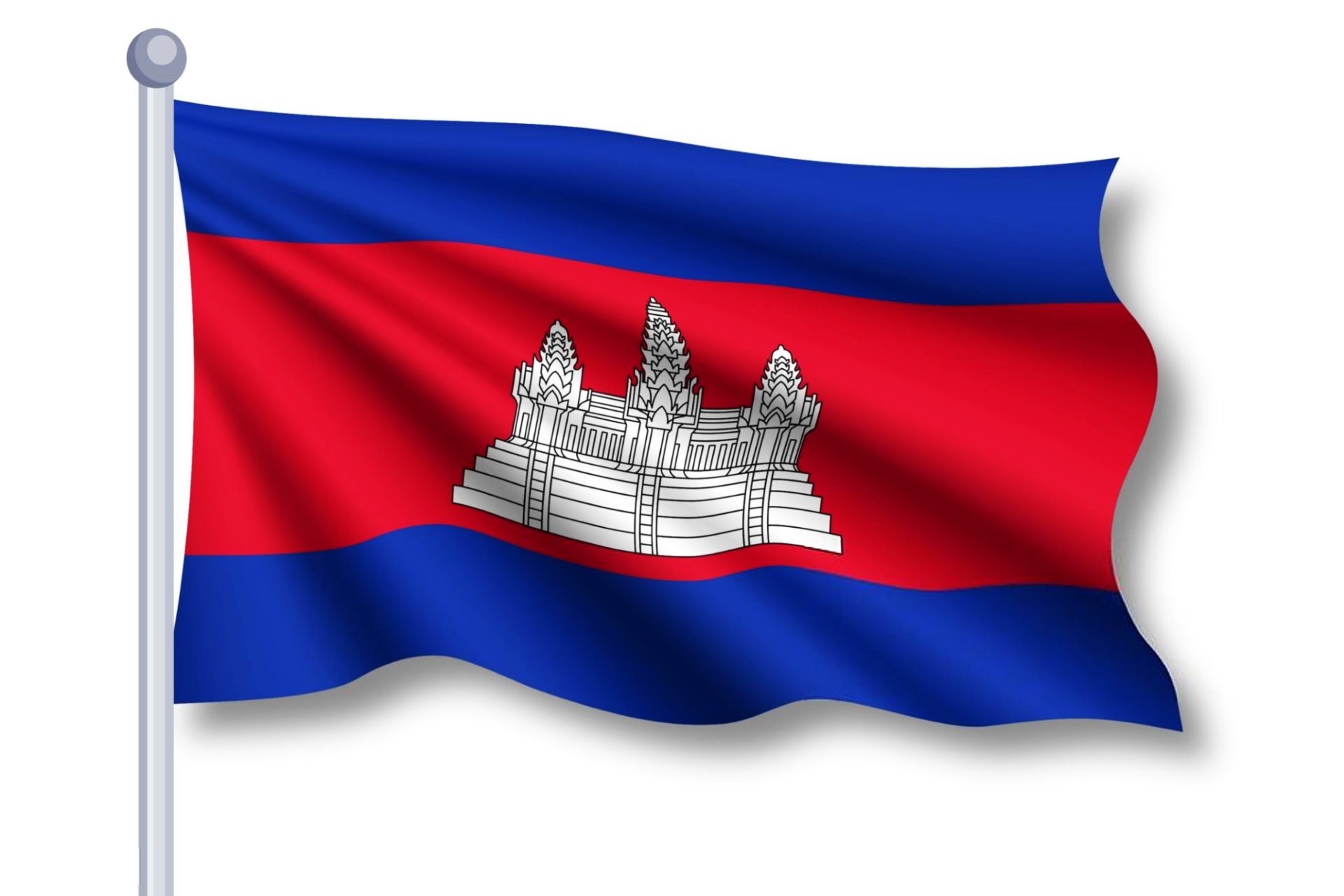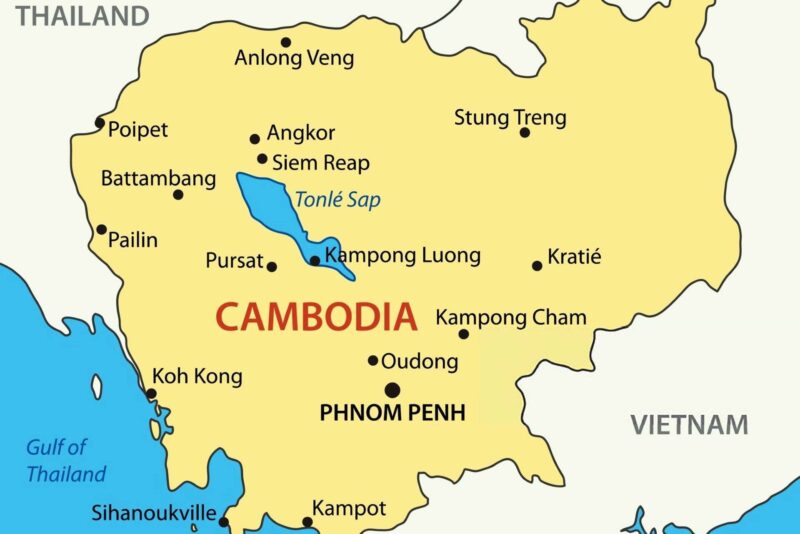Kingdom of Cambodia
Population: 16.94 Millions
Area : 181.035 km²
Capital : PHNOM PENH
Language : Khmer
Religion : Buddhism
Currency : Riel
Overview of Cambodia
Cambodia, officially known as the Kingdom of Cambodia, is a country located in the heart of Southeast Asia. It shares borders with Thailand to the west and northwest, Laos to the north, Vietnam to the east and south, and the Gulf of Thailand to the southwest. With a rich history, diverse culture, and a challenging past, Cambodia has made significant strides in its development and is an increasingly important player in the region. This overview provides insight into Cambodia’s geography, history, economy, culture, politics, and society.
Geography
Cambodia spans an area of approximately 181,035 square kilometers (69,898 square miles), making it the 88th largest country in the world. The country is characterized by a predominantly low-lying landscape with a central plain, bordered by the Tonle Sap Lake, the largest freshwater lake in Southeast Asia, and the Mekong River, which flows from the north through the country and into Vietnam. The northern and southwestern regions of Cambodia are more mountainous, with the Cardamom and Dangrek mountain ranges. These regions are rich in biodiversity, offering a variety of flora and fauna, including endangered species like the Indochinese tiger and the Asian elephant.
The climate is tropical, with a monsoon season from May to October and a dry season from November to April. Cambodia experiences high humidity and temperatures averaging around 25–30°C (77–86°F). The country’s geography plays a significant role in shaping its agriculture and economy, with the fertile plains around the Mekong River and Tonle Sap providing the foundation for rice farming, which is the country’s staple crop.
History
Cambodia has a long and storied history that dates back over a thousand years, with its most famous period being the era of the Khmer Empire. The Khmer Empire, which lasted from the 9th to the 15th centuries, was one of the most powerful empires in Southeast Asia. During this time, the Khmer people built monumental structures, most notably the Angkor Wat temple complex, which remains a symbol of national pride and one of the most visited archaeological sites in the world.
However, following the fall of the Khmer Empire in the 15th century, Cambodia entered a period of instability and foreign influence. It was invaded and occupied by neighboring countries, including Thailand and Vietnam. In the 19th century, Cambodia became a French protectorate, and under French colonial rule, the country’s infrastructure and economy were modernized, but the Cambodian people were subjected to exploitation.
Cambodia’s history took a dark turn in the 20th century. In the 1960s and 1970s, the country was drawn into the Vietnam War, and in 1975, the Khmer Rouge, led by Pol Pot, took power. The Khmer Rouge regime implemented radical and violent policies that led to the deaths of an estimated 1.7 to 2 million people, or roughly a quarter of the country’s population, through executions, forced labor, and famine. This period, known as the Cambodian Genocide, left a deep scar on the nation.
The Khmer Rouge regime was overthrown in 1979, and Cambodia was subsequently occupied by Vietnam until 1989. Following years of civil conflict and political instability, Cambodia began a process of reconciliation and rebuilding in the 1990s, with the assistance of the United Nations and international community. The 1993 peace agreement restored the monarchy under King Norodom Sihanouk, and the country held its first democratic elections. Cambodia has since made significant progress, though challenges remain.
Politics and Governance
Cambodia is a constitutional monarchy, with a parliamentary democracy. The king, currently King Norodom Sihamoni, serves as the head of state but holds a largely ceremonial role. The political system is based on a multi-party framework, with the prime minister as the head of government. The country has a bicameral legislature, consisting of the National Assembly and the Senate. Political power has been dominated by the Cambodian People’s Party (CPP), led by Prime Minister Hun Sen, who has been in power since 1985.
Under Hun Sen’s leadership, Cambodia has experienced relative political stability and economic growth. However, the country’s political system has been criticized for its authoritarian nature, with limited political freedoms, suppression of opposition parties, and restrictions on the media and civil society. In recent years, there have been crackdowns on dissent, with opposition parties being disbanded, and political leaders arrested or exiled. International human rights organizations have raised concerns about the state of democracy and human rights in Cambodia.
Economy
Cambodia’s economy has shown remarkable growth in recent years, transitioning from one of the poorest countries in the world to a lower-middle-income nation. The country’s GDP has grown at an average rate of 7% annually over the past decade, driven primarily by sectors such as garments, construction, agriculture, and tourism.
Agriculture remains an essential part of Cambodia’s economy, with rice being the primary crop. The country also produces a variety of other agricultural products, including cassava, rubber, and fish, which is a staple of the Cambodian diet. The Tonle Sap Lake and the Mekong River are crucial for the country’s fishing industry.
The garment and textiles industry is another major contributor to Cambodia’s economy, accounting for a significant portion of its exports. The sector has attracted foreign investment due to Cambodia’s low labor costs and favorable trade agreements with the European Union and the United States.
Tourism is also an important part of Cambodia’s economy. The country’s cultural heritage, particularly the Angkor temples, attracts millions of visitors annually. Additionally, Cambodia’s beaches, eco-tourism destinations, and vibrant cities like Phnom Penh have drawn increasing numbers of international tourists.
Despite these advancements, Cambodia remains highly dependent on foreign aid and investment. There are also concerns about income inequality, corruption, and environmental degradation, particularly due to deforestation and the impacts of development on natural resources.
Society and Culture
Cambodia has a population of approximately 17 million people, with ethnic Cambodians (Khmer) making up around 90% of the population. Minority groups include Cham Muslims, Vietnamese, and Chinese. The majority of Cambodians practice Theravada Buddhism, which plays a central role in the country’s cultural and social life. Buddhist temples (wats) are scattered throughout Cambodia, and religious festivals, such as the Khmer New Year and the Water Festival, are widely celebrated.
The Cambodian language, Khmer, is the official language and is spoken by the vast majority of the population. French and English are also used, particularly in urban areas and for business and education. Cambodia’s rich cultural heritage includes traditional dance, music, and art, with classical Cambodian dance being one of the most recognized cultural forms.
The Cambodian genocide left an indelible mark on the population, and many families continue to struggle with the psychological effects of trauma. In recent decades, Cambodia has made strides in education, healthcare, and infrastructure, but challenges such as poverty, corruption, and access to quality healthcare persist.
Conclusion
Cambodia is a country with a rich cultural heritage and a history marked by both achievements and tragedies. From the grandeur of the Khmer Empire to the devastation of the Khmer Rouge regime, Cambodia’s past has shaped its present and future. Today, the country is emerging as a growing economy with an expanding tourism sector, yet it faces significant political and social challenges. As Cambodia continues to develop, it will need to balance economic growth with political reform and ensure that the lessons of its past inform its future progress.



 Show all photos
Show all photos 
